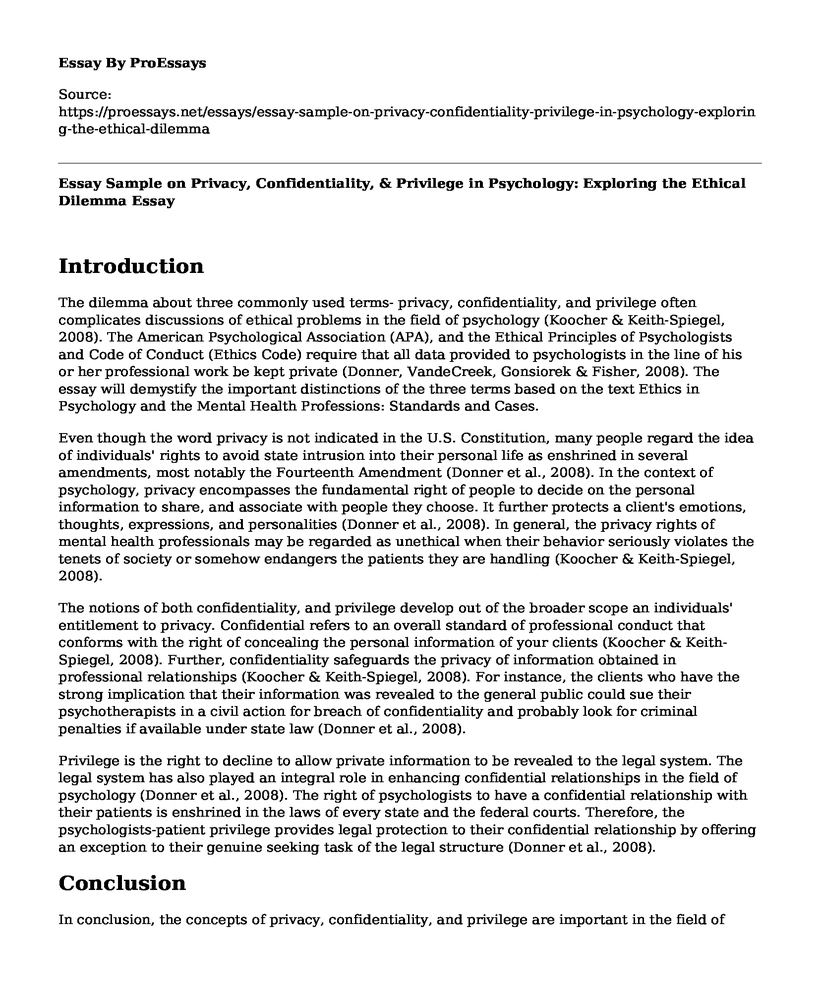Introduction
The dilemma about three commonly used terms- privacy, confidentiality, and privilege often complicates discussions of ethical problems in the field of psychology (Koocher & Keith-Spiegel, 2008). The American Psychological Association (APA), and the Ethical Principles of Psychologists and Code of Conduct (Ethics Code) require that all data provided to psychologists in the line of his or her professional work be kept private (Donner, VandeCreek, Gonsiorek & Fisher, 2008). The essay will demystify the important distinctions of the three terms based on the text Ethics in Psychology and the Mental Health Professions: Standards and Cases.
Even though the word privacy is not indicated in the U.S. Constitution, many people regard the idea of individuals' rights to avoid state intrusion into their personal life as enshrined in several amendments, most notably the Fourteenth Amendment (Donner et al., 2008). In the context of psychology, privacy encompasses the fundamental right of people to decide on the personal information to share, and associate with people they choose. It further protects a client's emotions, thoughts, expressions, and personalities (Donner et al., 2008). In general, the privacy rights of mental health professionals may be regarded as unethical when their behavior seriously violates the tenets of society or somehow endangers the patients they are handling (Koocher & Keith-Spiegel, 2008).
The notions of both confidentiality, and privilege develop out of the broader scope an individuals' entitlement to privacy. Confidential refers to an overall standard of professional conduct that conforms with the right of concealing the personal information of your clients (Koocher & Keith-Spiegel, 2008). Further, confidentiality safeguards the privacy of information obtained in professional relationships (Koocher & Keith-Spiegel, 2008). For instance, the clients who have the strong implication that their information was revealed to the general public could sue their psychotherapists in a civil action for breach of confidentiality and probably look for criminal penalties if available under state law (Donner et al., 2008).
Privilege is the right to decline to allow private information to be revealed to the legal system. The legal system has also played an integral role in enhancing confidential relationships in the field of psychology (Donner et al., 2008). The right of psychologists to have a confidential relationship with their patients is enshrined in the laws of every state and the federal courts. Therefore, the psychologists-patient privilege provides legal protection to their confidential relationship by offering an exception to their genuine seeking task of the legal structure (Donner et al., 2008).
Conclusion
In conclusion, the concepts of privacy, confidentiality, and privilege are important in the field of psychology. One common factor about them is they ensure that the information of a patient is not revealed to wrong parties, individuals without the consent of the patient. Privilege can be explained as the legal right given to psychologists to ensure they have a stable confidential relationship with the client without having to be bothered by intrusions.
References
Donner, M. B., VandeCreek, L., Gonsiorek, J. C., & Fisher, C. B. (2008). Balancing confidentiality: Protecting privacy and protecting the public. Professional Psychology: Research and Practice, 39(3), 369a. Retrieved from file:///C:/Users/User/Downloads/Balancing_Confidentiality_Protecting_Privacy_and_P.pdf
Koocher, G. P., & Keith-Spiegel, P. (2008). Ethics in psychology and the mental health professions: Standards and cases. Oxford University Press. Retrieved from https://books.google.co.ke/books?hl=en&lr=&id=TBPu12z0f8oC&oi=fnd&pg=PR11&dq=Ethics+in+Psychology+and+the+Mental+Health+Professions:+Standards+and+Cases,&ots=wkxH_K9Ptk&sig=Ugfdc5knVB_QFLk1CtsQuy-ax8s&redir_esc=y#v=onepage&q=A%20Problem%20of%20Definitions&f=false
Cite this page
Essay Sample on Privacy, Confidentiality, & Privilege in Psychology: Exploring the Ethical Dilemma. (2023, Apr 08). Retrieved from https://proessays.net/essays/essay-sample-on-privacy-confidentiality-privilege-in-psychology-exploring-the-ethical-dilemma
If you are the original author of this essay and no longer wish to have it published on the ProEssays website, please click below to request its removal:
- Report Example on Darkness Visible: A Memoir of Madness
- The Influence of Social Media on Teen's Self Esteem Paper Example
- Essay Sample on Neutralization of Race Supremacy in South Africa
- Essay on Jesus on Anger: Hatred Equals Murder in Christian Beliefs
- The Relation of the Elderly and Poverty to the Disciplines of Psychology - Paper Example
- Essay Sample on Chinese Women: Politics, Love, and Identity
- Paper Example on Project C: Affordable Housing for Local Community's Young Families







